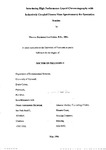Interfacing High Performance Liquid Chromatography with Inductively Coupled Plasma Mass Spectrometry for Speciation Studies
| dc.contributor.author | Cairns, Warren Raymond Lee | |
| dc.contributor.other | School of Geography, Earth and Environmental Sciences | en_US |
| dc.date.accessioned | 2013-10-14T09:09:52Z | |
| dc.date.available | 2013-10-14T09:09:52Z | |
| dc.date.issued | 1996 | |
| dc.identifier | NOT AVAILABLE | en_US |
| dc.identifier.uri | http://hdl.handle.net/10026.1/2193 | |
| dc.description.abstract |
A novel interface for the coupling of high performance liquid chromatography (HPLC) with inductively coupled plasma mass spectrometry (ICP-MS) for the speciation of organometallic compounds has been developed and utilised for a number of diverse applications. Desolvation of the sample prior to reaching the plasma is shown to facilitate a more versatile coupling of the two instrumental techniques. This has been achieved by first volatilising the aerosol after nebulisation of the sample in a heated cyclone spray chamber. The resulting vapour is removed using a membrane drier and a thermoelectrically cooled condenser. The apparatus developed has been fully optimised to facilitate the introduction of a range of organic solvents, particularly those used as mobile phases for HPLC separations such as acetonitrile and methanol. This interface also facilitates gradient elutions to be used with ICP-MS for the first time. The interface developed has enabled the use of HPLC-ICP-MS to speciate the metabolites of a novel platinum based chemotherapy drug, JM-216, in human plasma ultrafiltrate. This approach offers a number of advantages over existing techniques especially in terms of speed of analysis and sensitivity. The platinum containing metabolites derived from this drug have been separated, identified, and compared to those arising from the breakdown of cisplatin and carboplatin in both plasma ultrafiltrate and an aqueous solution. A detection limit of 119 pg of Pt has been achieved for real samples. The interface has also been used for the speciation of organotin and organolead compounds in environmental samples, and to investigate the speciation of metals in tea liquors. It was found that although the apparatus proved beneficial for both the determination of organotins and the identification of metal containing species in tea, its use adversely affected the analysis of organolead compounds. The results of these latter studies are critically assessed and discussed with respect to HPLC-ICP-MS interface design. | en_US |
| dc.description.sponsorship | Fisons Instruments Elemental, Ion Path Road 3, Winsford, Cheshire, CW7 3BX and Johnson Matthey Technology Centre, Blounts Court, Sonning Common, Reading, RG4 9NH | en_US |
| dc.language.iso | en | en_US |
| dc.publisher | University of Plymouth | en_US |
| dc.title | Interfacing High Performance Liquid Chromatography with Inductively Coupled Plasma Mass Spectrometry for Speciation Studies | en_US |
| dc.type | Thesis | en_US |
| dc.identifier.doi | http://dx.doi.org/10.24382/1324 | |
| dc.identifier.doi | http://dx.doi.org/10.24382/1324 |
Files in this item
This item appears in the following Collection(s)
-
01 Research Theses Main Collection
Research Theses Main


